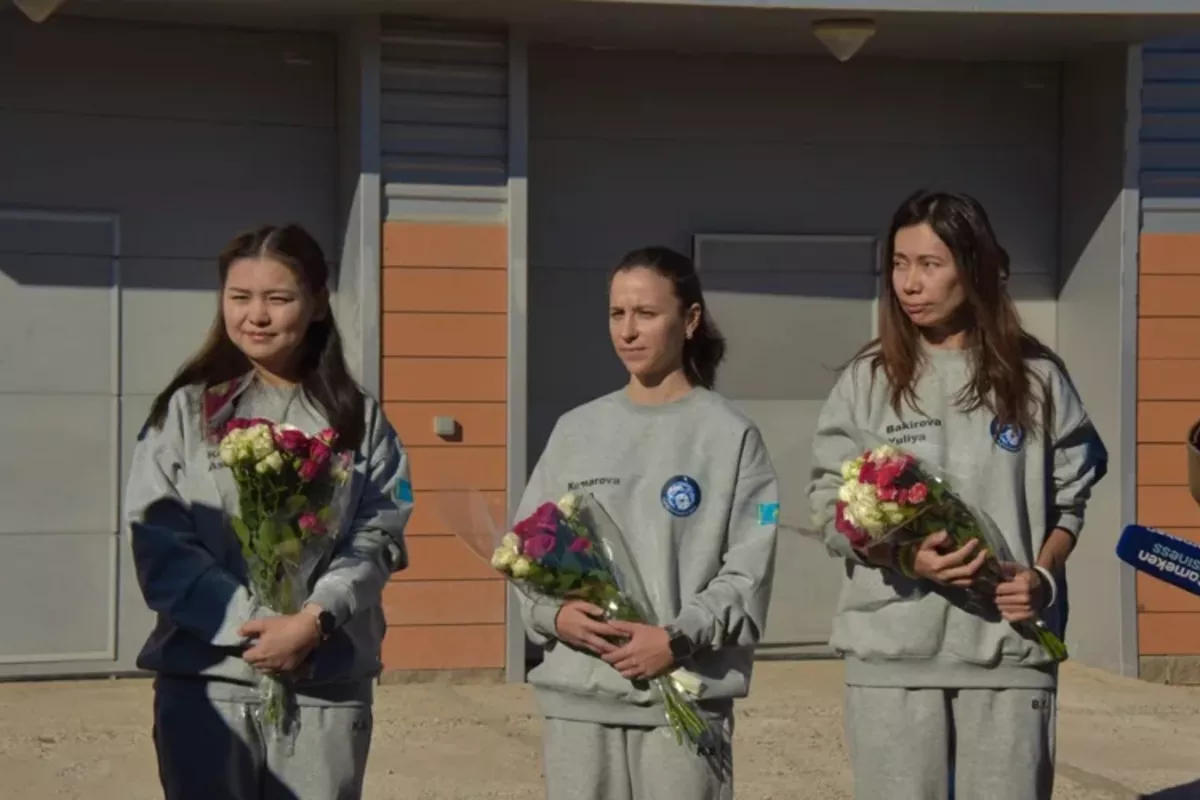
photo: Kazinform
Kazakhstan’s groundbreaking space research initiative, SANA-1 - the country’s first long-duration crew isolation experiment simulating spaceflight conditions - has officially concluded in Astana.
The all-female research crew exited a specially designed ground-based spacecraft simulator on October 10, completing a 10-day mission that tested psychological endurance, scientific skills, and operational protocols under conditions similar to those experienced during space missions, The Caspian Post informs via Kazakh media.
The team was warmly greeted by Major General of Aviation and Kazakhstan’s first cosmonaut, Toktar Aubakirov, who praised the participants for their contribution to Kazakhstan’s growing space science sector. Representatives from Kazakhstan Gharysh Sapary, other space institutions, and media outlets were also in attendance.
Simulating Life in Space
During the experiment, the crew lived in complete isolation, adhering to strict schedules and protocols that mirrored those of real space expeditions. The mission involved conducting medical, cognitive, and behavioral studies, as well as technical and educational experiments within the confines of the mock spacecraft.
“We followed a fixed daily routine: mornings began with breakfast, physical exercise, and relaxation sessions, followed by focused work at our stations,” said Darya Komarova, Senior Engineer at the Republican Center for Space Communication.
“We carried out cognitive tasks and monitored brain activity. For six hours each day, we wore headsets to track concentration and relaxation levels.”
Each crew member had individual research responsibilities. Tasks included growing microgreens without soil, assembling devices to measure temperature and pressure, and creating a thermal map of the capsule. Throughout the mission, smartwatches monitored participants’ health and physiological data.
“We were not only the subjects of the experiment, but also its operators,” added Yulia Bakirova, Crew Commander and Chief Research Fellow at the Jet Propulsion Laboratory of the National Center of Space Research and Technology.
Limited Contact, Strong Team Bond
The crew operated with minimal outside contact. Meals were delivered without direct interaction, and free time was limited to 1-2 hours per day, during which the women relaxed by playing the guitar, board games, or simply talking. An eight-hour sleep schedule was mandatory.
While the mission began with four members, engineer Linara Zhadigerova exited the experiment partway through. The remaining three completed the full mission:
Yulia Bakirova - Crew Commander, Chief Research Fellow at JSC National Center of Space Research and Technology
Assem Kuandyk - Research Fellow, Laboratory of Heat Insulation Materials, JSC National Center of Space Research and Technology
Darya Komarova - Senior Engineer, Republican Center for Space Communication
Recognition and Future Potential
At the conclusion of the mission, participants were awarded certificates of completion and lauded by Toktar Aubakirov, who emphasized the symbolic and scientific importance of the project.
“You have laid the foundation for Kazakhstan’s space future,” he said. “It is not easy to spend 10 days in confinement, seeing the same faces, following strict routines - but you carried it out with grace and determination. Women are incredibly strong, and this mission proves that they are ready for space.”
Aubakirov also noted that such experiments are crucial to preparing for future Kazakh participation in international space missions, particularly with the growing emphasis on diversity and gender inclusion in space exploration.
Looking Ahead
The SANA-1 mission, launched on October 1, marks a significant milestone in Kazakhstan’s space research efforts. It not only provides valuable scientific data but also signals the country's ambition to play a greater role in global space science - with its own experts, technology, and vision.
Share on social media